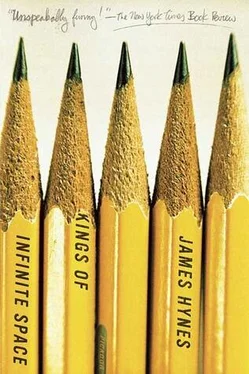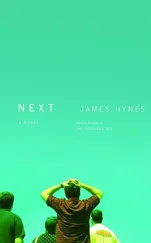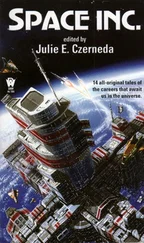“ ’Cause I don’t see the conference room set up.” Rick lifted himself on his toes, peering over Paul’s cube at the darkened doorway of the conference room.
“I’m just on my way to pick up the laptop and the projector.” Paul gestured over his shoulder. Behind him he heard the steady whine of the dying tech writer and the squeak of his chair as the man turned back to his work.
“Then chop chop, son,” said Rick. “Let’s get this show off the ground.” Rick loped off, chin lifted, eyebrows dancing. Paul slipped into his cube and looked at his calendar. He cursed under his breath: He had forgotten that this morning his team was presenting the draft RFP to the maintenance managers of the districts selected for the outsourcing project. Luckily, he had remembered to book the conference room, the laptop, and the projector, and he still had time to set up the meeting before the managers arrived. He was halfway up the aisle before he realized he still had the Post-it in his fist, and he whirled, nearly blundering into Renee, and dashed back to his cube. He tossed the Post-it in his trash, dashed out past a glowering Renee, stopped short, dashed back again, and retrieved the Post-it. He smoothed the little yellow square against his desktop, then opened his top drawer, dropped it in, and let the drawer slide shut. As Paul passed the dying tech writer’s doorway, the little man pointed silently at the ceiling with a bony gray finger.
Paul left the submarine hush of cubeland and hustled down the bright main hallway towards Building Services. Today’s meeting was likely to be a tense one. At the suggestion of the free-spending lobbyists of several large multinational corporations, the contribution-hungry Texas state legislature had mandated that TxDoGS outsource, or privatize, the maintenance of its fleet of vehicles — everything from sedans to forklifts to dump trucks — in three of the agency’s twenty-five maintenance districts. If private maintenance turned out to be cheaper than using TxDoGS’s own mechanics, then the program would be extended to the entire state, and several hundred state employees would be out of work. This morning the maintenance managers in the three districts selected for the pilot program — Odessa, San Antonio, and Nacogdoches — would be introduced to the project. They would be shown the PowerPoint slideshow Paul had concocted, and each man would be given a draft of the project’s Request for Proposal, or RFP. The RFP Development Team — Rick, the Colonel, J.J., Bob Wier, and Paul — would explain how it was a good thing that three dozen minimum-wage mechanics in Odessa, San Antonio, and Nacogdoches were about to lose their jobs.
At the end of the hall Paul had a glimpse over the balcony into the lobby below, where Preston rocked on the balls of his feet and smoothed his bushy moustache with two quick strokes, down and across. Then Paul stepped into Building Services, a windowless, two-room suite lined with shelves loaded with slide projectors, video projectors, overhead projectors, tape recorders, and laptops. Nobody sat at the desk in the first room, so Paul went deeper and found Callie the Mail Girl behind the desk in the farther room hunched over something in her lap. She was massaging the back of her long neck with one hand, and as Paul came in, she turned a page with her other hand. Paul cleared his throat, and she whisked her hand away from her neck onto her lap, covering up whatever she was reading. She blushed a deep red, which made her freckles glow even in the harsh fluorescent light.
“I booked a laptop and a projector for this morning.” Paul came up to the desk and tried to see what Callie was reading. She shoved it into the kneehole of the desk.
“Let’s go, um, check the sign-out sheet,” she said, in her subdued drawl. Under the desk she let go of the volume she was holding, and it made a phonebook-sized thump on the floor. Paul backed up as Callie came around the desk, still blushing. She was easily as tall as Paul, maybe even an inch or two taller. She was also very pale, and Paul swore he could feel the heat from her blazing face as she passed. Standing behind her as she bent over the sign-out book on the desk in the other room, he let his eyes drift down Callie’s long waist to her full hips, admiring the tautness of her t-shirt.
Paul backed up as she moved to the shelves. She handed him a laptop without a word, then lifted her long arms and forcefully yanked a bulky video projector off an upper shelf. Paul admired the sudden definition of her upper arm as she lowered the projector onto its little wheels and jerked the towing handle out of its slot. Paul dipped his head and saw a thick volume on the floor under the desk, a computer manual perhaps or an almanac. Callie has aspirations, thought Paul. Don’t we all?
“Don’t forget to sign it in again,” she said, deftly kicking the book under the desk out of sight, “when you bring it back.” Fergit , she said, and brang . Paul smiled at her as he backed out of the office lugging the laptop and dragging the projector on its little wheels, but she had stooped under the desk to retrieve her book and wasn’t watching him.
In the conference room, Paul hoisted the projector with a grunt onto the conference table — damn, she must work out, he thought, flashing on Callie’s biceps — and plugged both units into the wall and into each other. He started the laptop and dashed back to his cube for the PowerPoint disk as well as the stack of RFPs he’d copied during his fit of conscientiousness yesterday. He placed a copy in front of every chair around the table, then he yanked down the screen at the end of the room and fired up the projector and ran quickly through the slideshow. He clicked on the last slide just as Rick came in the door leading the maintenance managers and the rest of the RFP team. The men distributed themselves around the table in a basso rumble of bonhomie and joshing. Rick edged down the room to sit at the end of the table, with Paul at his right hand.
“This cheer’s our technical writer,” Rick announced, and all eyes turned to Paul. “He used to be an English professor, so make sure you dot your p’s and q’s.”
Paul’s face got hot, and he hoped he wasn’t blushing as bright as Callie had.
“Tech writer?” The Colonel settled into the chair on Paul’s right and gave him a long look. “Since when?”
“Since yesterday,” mumbled Paul, desperate to change the subject. “The PowerPoint thing is all loaded and ready to go,” he said to Rick, pushing over a copy of the slideshow’s script.
“Way-ul, let’s try this shoe on and see who salutes,” said Rick. “Somebody get the lights and shut the door.”
“Tech writer,” said the Colonel, regarding Paul sidelong. “Huh.”
The projector’s little fan hummed as the first slide flashed on the screen at the far end of the table. In the pearly reflection of the screen, Paul noted that the visiting managers all sat on one side of the table, the RFP team on the other. To Paul’s right sat the Colonel, leaning forward on his elbows with his hands manfully clasped, as if he were in a briefing room at the Pentagon. On the other side of him, J.J. slumped in his chair, glowering at the screen, while in the chair beyond him Bob Wier nodded solemnly as Rick clicked to the next slide, which read:
Districts Selected
1. Odessa
2. San Antonio
3. Nacogdoches
“This is y’all,” said Rick, which wasn’t in the script. “Your names in lights.”
“Ain’t we lucky,” said the Nacogdoches manager dryly. The other two managers looked on impassively. Odessa was a thin, balding, colorless guy with a turquoise belt buckle who looked like he’d rather be someplace else; San Antonio was a barrel-chested, bullet-headed Mexican American with a canny light in his eye. But the focus of the room, the one man Rick seemed to direct his pitch to, was the Nacogdoches manager, a big, raw-boned, slope-shouldered East Texan, who scowled at the screen. He had found a seat at the corner of the table that allowed him to stretch his long legs, and now he sat with his big hand on the table, drumming his enormous fingers a little more slowly with each successive slide. In the presence of the man’s obvious displeasure, Paul was glad he had deleted the obnoxious little animations from the presentation. Rick, however, scarcely seemed to notice the man’s disdain, narrating the presentation in his usual clipped singsong. The Colonel kept interrupting, plucking a laser pointer from his breast pocket—“Rick, if I may?”—and directing the managers’ attention to a particular bullet point with a wobbly little red dot. He spoke to Nacogdoches directly, man to man.
Читать дальше












